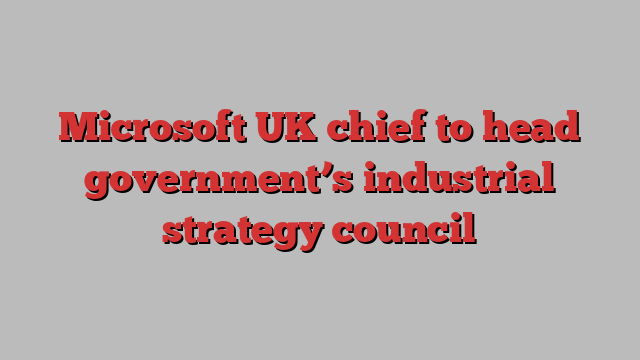
Unlock the Editor’s Digest for free
Roula Khalaf, Editor of the FT, selects her favourite stories in this weekly newsletter.
Clare Barclay, the chief executive of Microsoft UK, has been appointed to a new role overseeing the British government’s industrial strategy.
Barclay will chair the Industrial Strategy Advisory Council, which will provide advice to the government in partnership with businesses, unions and other stakeholders.
“Whilst we fully embrace the industries of today, we must also have a clear plan for future growth, and the advisory council will play a central role in shaping and delivering this plan,” she said.
Her appointment is being announced on the eve of a big investment summit hosted by senior ministers in central London on Monday. Sir Keir Starmer hopes that the summit will be a chance to emphasise Britain’s newfound political stability and his plan to “get Britain building again” — for example through planning reforms — while also trying to reassure executives about tax rises in the October 30 Budget.
Starmer is expected to say that regulators should ensure that they are not acting as barriers to economic growth.
Ministers will emphasise their plans for a National Wealth Fund to help pay for decarbonisation of heavy industry and a new state-owned green energy lender called GB Energy.
The summit is being sponsored by Barclays, HSBC, Lloyds, M&G, Octopus Energy and TSL, and attendees will include Goldman Sachs chief executive David Solomon, GSK chief Emma Walmsley and former Google chair Eric Schmidt.
Although hundreds of senior business figures will attend the event, some have complained about poor organisation, while a suggestion by port operator DP World that it could delay a £1bn investment pledge, after ministerial criticism of its subsidiary P&O, prompted a cabinet row on Friday.
Jonathan Reynolds, the business secretary, will tell the summit that his new industrial strategy is designed to draw global investment away from rival nations and “put Britain back on the global stage”.
“Our modern industrial strategy will hardwire stability for investors and give them the confidence to plan not just for the next year, but for the next 10 years and beyond,” he said.
The industrial strategy will focus on eight sectors where he said the UK had a competitive edge: creative industries, financial services, advanced manufacturing, professional services, defence, tech, life sciences and clean energy industries.
It will be finalised after a widespread consultation with business following a green paper to be issued on Monday.
The Industrial Strategy Council will be a statutory body, along the lines of the Office for Budget Responsibility and the Committee on Climate Change, making it harder for ministers to ignore its findings and recommendations.
Barclay’s appointment signals a recovery in relations between the UK and Microsoft, which was last year frustrated by the Competition and Markets Authority’s decision to block its $75bn takeover of video-gaming business Activision Blizzard over antitrust concerns.
Brad Smith, Microsoft vice-president, argued at the time that the decision, which was made during the previous Conservative administration, would “discourage innovation and investment” while Activision accused Britain of being “closed for business”. The CMA later waved the deal through after Microsoft agreed to change aspects of the transaction.
Barclay has led Microsoft’s UK operations since 2020. She was also a non-executive director at the CBI business lobby group when it was plunged into scandal last year over allegations of serious sexual misconduct and bullying.
The government said it would announce an interim advisory council under Barclay in the coming weeks.